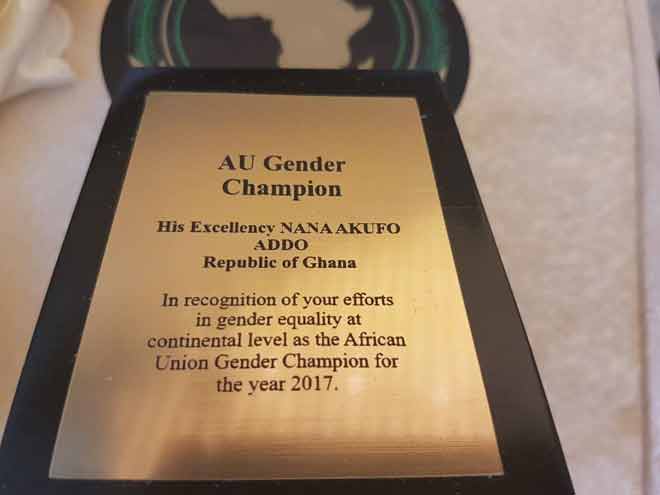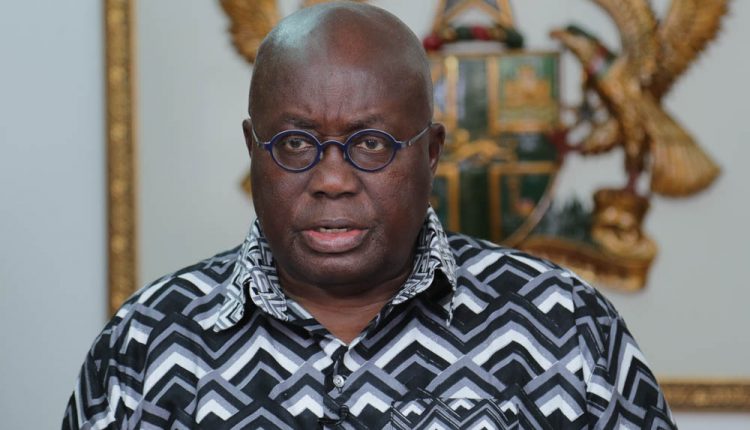Ghana’s President, Nana Akufo Addo in 2017 was named the “AU Gender Champion” by the United Nations Economic Commission for Africa (UNECA).
The African Union said he was being awarded in recognition of his “efforts in gender equality at continental level.”
That meant among his fellow African leaders he was considered the best when it comes to championing gender equality.
It also meant the Ghanaian President has worked hard in giving women the opportunity to serve in his government.
There are however doubts about the success of his presidency in giving more women the chance to serve in top political positions.

Why the anger?
But this week, the President seems to have angered a lot of women in his country.
This was after he claimed that “not enough movement has been made by women in Ghana” to change the political structure that keeps women away from leadership roles.
Women form 52 percent of Ghana’s population but President Akufo Addo told a gathering of women in Canada that “not enough movement is being made by the 52% of the Ghanaian population that are women to be able to be in the position to make these decisions.”
The Ghanaian President went further to explain that although his cabinet is made up of 30% women, they lack dynamism and activism.
Many among the audience at the Women Deliver Conference at Vancouver in Canada sounded unhappy with his reasoning.
But the President appeared to be passionate about his comment and the reasons why a lot of women in Africa are not in top political positions.
Nana Akufo Addo wants more from women in Ghana and Africa to change ensure gender equality.
Push back from women
Hours after his comments went viral, Ghanaian women have already launched an activism hashtag on twitter #WeAreThe52Percent to demand action from the president.
Esther Armah who is one of the activists behind the #WeAreThe52Percent movement said that “Our President @NAkufoAddo demonstrated at #WomenDeliver2019 that he is clearly out of touch with gender activism in his nation.
We are putting him back in touch with a call to action, legislation, policy regarding women, power and this president”.
I am a Ghanaian woman. I am one of the 52%. @NAkufoAddo said there is not enough dynamism and activism among Ghanaian women. He is wrong. He is out of touch. #WeAreThe52percent
— EstherArmah (@estherarmah) June 5, 2019
Many Ghanaian women disagree that they are not dynamic enough and not pushing for change.
More reactions
The latest activism has got many women talking about how dynamic they are to serve.
They are now challenging their President to remove the bottlenecks preventing women from serving.
Ghanaian women are dynamic and passionate about gender equality. @NAkufoAddo should stop complaining & start using his presidential power to remove the barriers that hold women down #WeAreThe52percent
— Ruby Ofori (@Rubyabenaofori) June 5, 2019
When people ask “what have you done in your community to cause change to demand that of others” please it is not about using shovel and building schools alone, if they could do that, why not. It is also about using your voice and platform #WeAreThe52percent
— Greek goddess (@Bridget_Otoo) June 5, 2019
Apparently the only dynamism the President of Ghana can see in Ghanaian women is the one that sees us re-electing him. #WeAreThe52percent
— Coretta Jonah (@Nana_Kory) June 5, 2019
Women are leading and are dynamic in Ghana@NAkufoAddo . Open the doors to power by creating and measuring socioeconomic impact and gender-lens policies that will include and impact more women. From government procurement to intervention programs… https://t.co/aUTWupvGkP
— Africa:Impact Investment-Tech-Agric-Diaspora-Angel (@amdecoafrica) June 5, 2019
Kenya’s President had his say
Meanwhile at the same event Kenya’s President Uhuru Kenyatta also spoken about empowering women to serve.
He told the gathering that “We need to make the society understand that women are as capable as men. We have to create an enabling environment and the opportunity for them to serve”.
The Women Deliver 2019 Conference is the world’s largest gathering on the rights, health and wellbeing of women and girls.
Over 8,000 delegates including world leaders, governments, policy makers, influencers, advocates, academics and activists attended this year’s conference.
The main agenda for the gathering is to come up with programmes to accelerate progress for girls and women globally.
Source: Africafeeds.com



